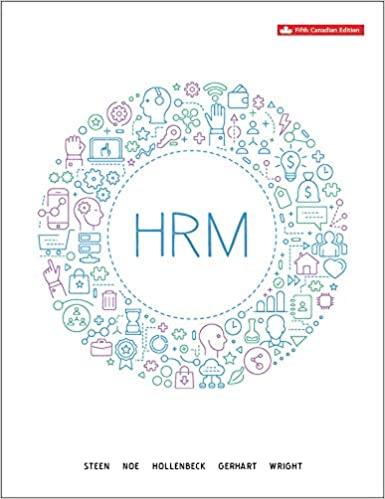Samantha Peters, Technical Director at Quantum Gaming, a video-game company, is conducting a scheduling meeting where she
Question:
Samantha Peters, Technical Director at Quantum Gaming, a video-game company, is conducting a scheduling meeting where she must ask employees to put in a serious amount of extra hours to meet a valued customer’s request. In addition to various challenges of her leadership, a discussion of the Quantum Gaming's overall responsibilities to its workers, corporate culture, and work-life balance issues sidetrack the meeting. The employees pressureSamantha to make a decision right then and there; however, she cannot confirm their requests before talking to upper management.
Profile
- Samantha Peters—Technical Director, Quantum Gaming—has been a Technical Director at Quantum Gaming for 12 years, managing a creative force of 40 people.
- Graham Hulbert—Programmer, Quantum Gaming—has been in the company’s design department for 21 years and is a little resentful of Peters for holding the position of Technical Director, although he hasn’t shown any ambition for the position himself.
- Miranda Cortez—Animator, Quantum Gaming—started working in the team two years ago after returning from unpaid maternity leave. Before that she had been working for the marketing department’s design team, but found her position too stressful and creatively limited.
- Tom Anderson—Modeler/Designer, Quantum Gaming—has been at the company since he graduated from university last fall. He’s still a little shell-shocked about being in the working world.
Backstory
Company culture at Quantum Gaming is falling apart. The employeesfeel overextended on a regular basis. In the past seven months, there have been no fewer than three projects which have pushed the team beyond capacity:
- The Back-to-School educational-games project ran over schedule due to “miscommunication” with the client; Quantum Gaming had failed to meet spec requirements. The fall-out from this situation included pushed back deadlines; consequentially, employees lost four full weekends to play catch-up.
- One of Arcadian’s (Quantum Gaming’s biggest clients) projects expanded in scope and three team members, Linda Kramer, Joe Berry, and Doug Courtier, ended up working two weeks of overtime—late nights and weekends—against a backdrop of inadequate recognition for their efforts.
- In an attempt to build more business, the Quantum Gaming took on a multi-player online games project, even though their skills in this field were limited. One member of the team, Mat Parsons, was burdened with the entire responsibility of producing a workable product. In the end, the project was abandoned and the client compensated by 150% of money paid.
Recently, four employees have quit. Among them, Linda Kramer and Doug Courtier cited stress, exhaustion, and “pathetic recompense” as the key reasons. Mat Parsons checked into rehab for a substance abuse problem after breaking down at the end of the multi-player online games project. Chronic insomnia and a state of hypertension had forced him over the edge.
Scene Setup
Peters arranges a 10am meeting with one of her teams to discuss working extra hours for two weeks to meet the valued client’s request.
The client, Arcadian, has put in a last-minute request to make changes to its new game’s central character before the release date next month. The changes include an overhaul of the design look and a reworking of the character’s special features.
In the meeting, the talking points will be:
- The number of extra hours needed to meet the team’s deadline two weeks from now—Peters will request they work evenings/early mornings and over the weekend.
- The inflexibility of the deadline. This client is extremely important as their business last year represented more than half of Quantum Gaming’s gross income. They call the shots.
- The need for each team member to contribute, as significant aspects of program and design will be affected.
- How the team will be compensated for taking on the extra workload—days in lieu, paid holiday, etc.
- Rescheduling of other projects to fit around the new deadline.
Peters has a tendency to postpone decisions, so the team presses for an immediate response; Peters is also under enormous pressure from the client and upper management.
Why is it important for Quantum Gaming workers to ask for a balance between work demands and their life? Why is it a smart move on the part of Quantum Gaming to help workers strike this balance?
Step by Step Answer:

Human Resource Management
ISBN: 9781259654930
5th Canadian Edition
Authors: Sandra Steen, Raymond Andrew Noe, John R. Hollenbeck, Barry Gerhart, Patrick M. Wright





